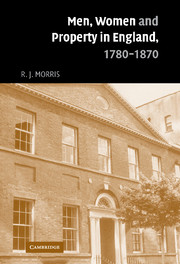 Men, Women and Property in England, 1780–1870
Men, Women and Property in England, 1780–1870 Book contents
- Frontmatter
- Contents
- List of figures
- List of tables
- Acknowledgements
- 1 Joseph Henry Oates: a world of madeira and honey
- 2 In search of the British middle class
- 3 Reading the wills: a window on family and property
- 4 The property cycle
- 5 Strategies and the urban landscape
- 6 Women and things and trusts
- 7 Life after death
- 8 Networks and place
- 9 The economic history of the British middle class, 1816–70
- 10 Conclusion and Epilogue
- Bibliography
- Index
2 - In search of the British middle class
Published online by Cambridge University Press: 28 July 2009
- Frontmatter
- Contents
- List of figures
- List of tables
- Acknowledgements
- 1 Joseph Henry Oates: a world of madeira and honey
- 2 In search of the British middle class
- 3 Reading the wills: a window on family and property
- 4 The property cycle
- 5 Strategies and the urban landscape
- 6 Women and things and trusts
- 7 Life after death
- 8 Networks and place
- 9 The economic history of the British middle class, 1816–70
- 10 Conclusion and Epilogue
- Bibliography
- Index
Summary
Labels, languages and discourses
The experience of Joseph Henry and his siblings in the 1820s was an important one but it was part of something much bigger. The Oates family were members of one of the urban elites which were growing in prominence and which shared experience with a wide range of profit-seeking, fee-earning, property-owning people. People of middling status have been identified in the populations of British towns and cities since at least the emergence of the early modern economy. The composition of this group varied and relationships with other social groups changed but trade and the control of manufacturing and professional positions and of the middle ranks of government authority had always been vital. The 1820s and 1830s were the years in which this group came to label itself and be labelled as a self-aware social group, ‘the middle classes’. The label was nearly always plural, suggesting an ambivalence regarding the homogeneity, if not coherence of the group. This was an accurate reflection of the wide range of economic status positions and the variety of ‘interests’ encompassed by the label. It was also a group often bitterly divided by religious and political faction.
The growing use of such labels has been seen as a response to the structural changes associated with industrialisation and economic development, together with the associated political experiences. Others have seen the growing language of class as an autonomous development related to political claims, notably those associated with the reform of parliament in 1832.
- Type
- Chapter
- Information
- Men, Women and Property in England, 1780–1870A Social and Economic History of Family Strategies amongst the Leeds Middle Class, pp. 20 - 78Publisher: Cambridge University PressPrint publication year: 2005


